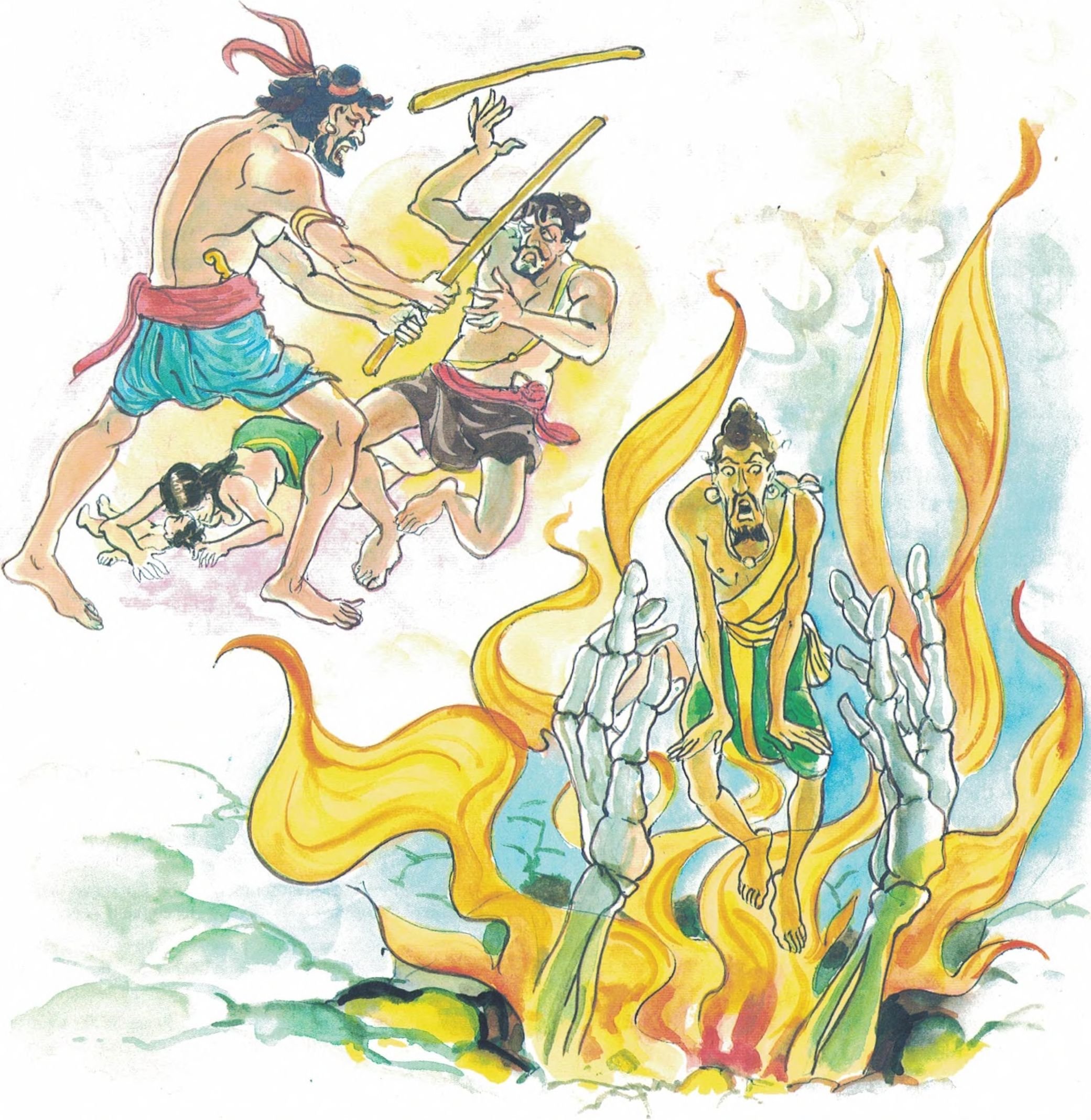Dhammapada (Illustrated)
by Ven. Weagoda Sarada Maha Thero | 1993 | 341,201 words | ISBN-10: 9810049382 | ISBN-13: 9789810049386
This page describes The Story of Nanda, the Herdsman which is verse 42 of the English translation of the Dhammapada which forms a part of the Sutta Pitaka of the Buddhist canon of literature. Presenting the fundamental basics of the Buddhist way of life, the Dhammapada is a collection of 423 stanzas. This verse 42 is part of the Citta Vagga (Mind) and the moral of the story is “A misdirected, misguided mind does to a person far greater harm than a bitter enemy”.
Verse 42 - The Story of Nanda, the Herdsman
Pali text, illustration and English translation of Dhammapada verse 42:
diso disaṃ yantaṃ kayirā verī vā pana verinaṃ |
micchāpaṇihitaṃ cittaṃ pāpiyo naṃ tato kare || 42 ||
42. Whatever foe may do to foe, or haters to those they hate the ill-directed mind indeed can do one greater harm.
 A misdirected, misguided mind does to a person far greater harm than a bitter enemy. |
The Story of Nanda, the Herdsman
While on a visit to a village in the kingdom of Kosala, the Buddha spoke this verse, with reference to Nanda, the herdsman.
Nanda was a herdsman who looked after the cows of Anāthapiṇḍika. Although only a herdsman, he had some means of his own. Occasionally, he would go to the house of Anāthapiṇḍika and there he sometimes met the Buddha and listened to his discourses. Nanda requested the Buddha to pay a visit to his house. But the Buddha did not go to Nanda’s house immediately, saying that it was not yet time.
After some time, while travelling with his followers, the Buddha went off his route to visit Nanda, knowing that the time had come for Nanda to receive his teaching properly. Nanda respectfully received the Buddha and his followers; he served them milk and milk products and other choice foods for seven days. On the last day, after hearing the discourse given by the Buddha, Nanda attained sotāpatti fruition. As the Buddha was leaving that day, Nanda carrying the bowl of the Buddha, followed him for some distance, paid obeisance and turned back to go home.
At that instant, a stray arrow shot by a hunter, killed him. Later the monks, who were following the Buddha, saw Nanda lying dead. They reported the matter to the Buddha, saying, “Venerable, because you came here, Nanda who made great offerings to you and accompanied you on your return was killed as he was turning back to go home.” To them, the Buddha replied, “Monks, whether I came here or not, there was no escape from death for him because of his previous kamma.”
Explanatory Translation (Verse 42)
diso disaṃ yaṃ taṃ kayirā verī vā pana verinaṃ
micchā paṇihitaṃ cittaṃ naṃ tato pāpiyo kare
diso: a robber; disaṃ [disa]: to a similar bandit; taṃ: to him whatever harm; kayirā: inflicts; verī vā pana: a hater; verinaṃ [verina]: to a hated person (inflicts some harm); micchā paṇihitaṃ [paṇihita]: misdirected; cittaṃ [citta]: mind; naṃ: to him; tato pāpiyo [pāpiya]: a worse crime than that; kare: does
When one bandit sees another, he attacks the second bandit. In the same way, one person sees someone he hates, he also does harm to the hated person. But what the badly deployed mind does to the possessor of the mind is far worse than what a bandit would do to another bandit or what one hater will do to another hater.
Commentary and exegetical material (Verse 42)
diso disaṃ: what one bandit does to another bandit. Similarly, the hater may do harm to another hater. The total implication of the verse is the harm that is done to a person by his own badly-managed mind is worse than what a bandit could do to another rival bandit, or two enemies do to each other. The undeveloped mind is one’s worst enemy.
micchā paṇihitaṃ: wrongly directed. One’s mind can be directed in the right manner. In such a situation the outcome is wholesome. When that happens, the mind well-directed proves to be one’s best friend. But, when the direction given to the mind is wrong, it can do greater harm to a person than even an enemy could.
micchā paṇihitaṃ cittaṃ: What is implied by this is one’s mind can do greater harm than one enemy could do to another. This way, a badly established mind is one’s own enemy–far worse than an outside enemy.
an ill-directed mind: That is, the mind directed towards the ten kinds of evil–namely, 1. killing, 2. stealing, 3. sexual misconduct, 4. lying, 5. slandering, 6. harsh speech, 7. vain talk, 8. covetousness, 9. ill-will, and 10. false belief.
